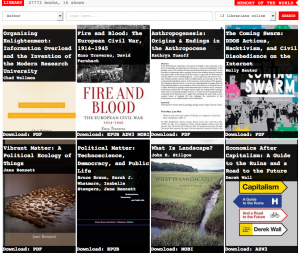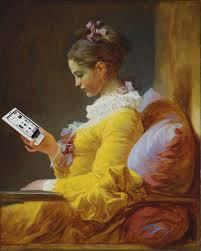At the end of December the Chaos Communication Congress (CCC) took place for the 32th time—this time again in Hamburg. The Chaos Computer Club calls it the „annual four-day conference on technology, society and utopia“. 12.000 hackers and computer experts came together to take part in about 130 lectures and workshops (see the recordings on https://media.ccc.de/c/32c3, many in English).
So what? What are the connections to public libraries?
Unfortunately there are not many—although libraries have widely open access policies, many digital resources, provide makerspaces, and even lend hardware such as Arduino, MaKey MaKey Kits, and wifi hotspots.
There was a presentation by Marcell Mars with the title „Public Library/Memory of the World. Access to knowledge for every member of society“. I was surprised that public libraries found their way to the programme of the CCC. But no, wait a moment: it is a presentation on Marcell Mars’ own shadow e-book-library. He just takes the notion of Public Library as the “universal space of free exchange of all knowledge” and turns himself and his friends into librarians.
“Mars’s project has taken this broad consensus [on public libraries] as the basis for Public Library and on-line book sharing project which promulgates the utopian hacker ethic of the universal space of free exchange of all knowledge by seeking to fuse a number of existing internet based projects for either managing or exchanging electronic publications (such as Calibre) along with his own plug ins to create a peer 2 peer culture for the exchange of books.” (http://new-tactical-research.co.uk/blog/1012/)
It is nonetheless very interesting to see how a library a hacker invents looks like. The „public library“ is a „distributed internet infrastructure for amateur librarians“ sharing their e-book-collections (and very likely not caring about any copyright rules).
So how shall an OPAC look like? On www.memoryoftheworld.org you see their approach: mere covers and a direct (!) link stating the format (PDF, EPUB, etc.) to the full text (of course there are search functions as well).
By the way: as a software for the backend e-book-management Marcell Mars uses Calibre: http://calibre-ebook.com/
Eine Bibliothek der Hacker: Wovon sie reden, wenn sie von Bibliotheken reden
Ende Dezember fand der 32. Chaos Communication Congress (CCC) statt – diesmal wieder in Hamburg. Der Chaos Computer Club bezeichnet den Kongress als die „jährliche viertägige Konferenz zu Technologie, Gesellschaft und Utopie“. 12.000 Hacker und Computerexperten trafen sich, um an 130 Vorträgen und Workshops teilzunehmen (die Aufzeichnungen der Vorträge finden sich auf https://media.ccc.de/c/32c3).
Was hat das mit Öffentlichen Bibliotheken zu tun? Worin bestehen die Verbindungen?
Leider gibt es bislang nicht allzu viele – obwohl Bibliotheken weithin Open Access Policies haben, eine Vielzahl an digitalen Ressourcen, Makerspaces besitzen und sogar Hardware ausleihen wie z. B. Arduino, MaKey MaKey Kits und WLAN-Hotspots.
Aber es gab einen Vortrag von Marcell Mars mit dem Titel “Öffentliche Bibliothek / Gedächtnis der Welt. Der Zugang zu Wissen für jedes Mitglied der Gesellschaft”. Ich war überrascht, dass Öffentliche Bibliotheken ihren Weg ins Programm des CCC gefunden hatten. Aber nein, Moment mal: Es handelt sich um einen Vortrag zu Marcell Mars’ eigener Schatten-E-Book-Bibliothek. Er übernimmt nur das Konzept der Öffentlichen Bibliothek als „universeller Ort des freien Austauschs von Wissen” und macht sich selbst und seine Freundinnen und Freunde zu Bibliothekar_innen.
„Mars’ Projekt nimmt den breiten Konsens zu Öffentlichen Bibliotheken als Basis seines ‘Public Library’-Projekts, des Projekts des Online-Büchertauschs. Er verkündigt die utopische Hacker-Ethik des universalen Ortes für den freien Austausch allen Wissens, indem er eine Anzahl bereits bestehender internetbasierter Projekte zur Verwaltung oder zum Austausch elektronischer Publikationen (wie Calibre) mit einem eigenen Plug-in verknüpft, um eine Peer-to-Peer-Kultur des Austauschs von Büchern zu schaffen.“ (http://new-tactical-research.co.uk/blog/1012/)
Nichtsdestotrotz ist es sehr interessant sich anzuschauen, wie eine Bibliothek aussieht, die ein Hacker erschafft. Die „Public Library“ ist eine „verteilte Internet-Infrastruktur für Amateur-Bibliothekar_innen“, die ihre E-Book-Sammlungen tauschen wollen (und sich wahrscheinlich nicht besonders um irgendwelche urheberrechtlichen Regeln scheren).
Wie sollte ein OPAC also aussehen? Auf www.memoryoftheworld.org ist der Hacker-OPAC zu sehen: bloße Cover und ein direkter (!) Link, mit Hinweis auf das Format (PDF, EPUB, etc.), zum Volltext (natürlich gibt es darüber hinaus auch Suchfunktionen).
Übrigens: Als Software für das Backend der E-Book-Verwaltung nutzt Marcell Mars Calibre: http://calibre-ebook.com/


